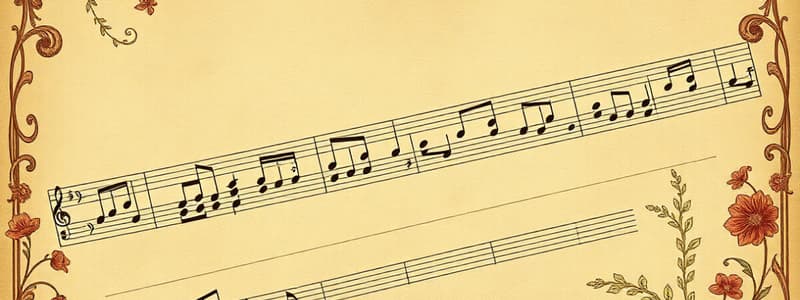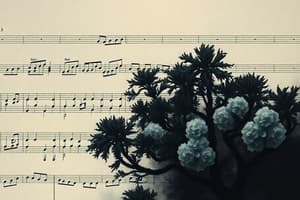Podcast
Questions and Answers
What does a whole note represent in terms of duration?
What does a whole note represent in terms of duration?
- The shortest note duration
- An even rhythm
- The longest note duration (correct)
- A medium note duration
Rests indicate sounds in music.
Rests indicate sounds in music.
False (B)
What is the purpose of a staff in music notation?
What is the purpose of a staff in music notation?
To represent notes and their pitches
The shape of a note determines its ______.
The shape of a note determines its ______.
Match the following note types with their corresponding duration:
Match the following note types with their corresponding duration:
Which of the following notes has the shortest duration?
Which of the following notes has the shortest duration?
Different rest shapes correspond to different durations of silence.
Different rest shapes correspond to different durations of silence.
Why are clefs important in music notation?
Why are clefs important in music notation?
Flashcards
Music Notation
Music Notation
Symbols that represent musical sounds (notes) and silences (rests).
Note
Note
A symbol on the staff representing a musical sound.
Rest
Rest
A symbol representing silence in music.
Staff
Staff
Signup and view all the flashcards
Pitch
Pitch
Signup and view all the flashcards
Note Duration
Note Duration
Signup and view all the flashcards
Note Value
Note Value
Signup and view all the flashcards
Rhythm
Rhythm
Signup and view all the flashcards
Study Notes
Introduction to Music Notation
- Music notation uses symbols to represent sounds and silences.
- These symbols are crucial for understanding and performing music.
- Notes represent musical sounds.
- Rests represent musical silences.
Notes
- Notes are written on a staff.
- A staff is a set of five horizontal lines and four spaces.
- Notes on different lines and spaces represent different pitches.
- Pitch refers to the highness or lowness of a sound.
- Notes have different shapes (e.g., whole, half, quarter, eighth).
- Note shapes determine the duration, or length, of the sound they represent.
- Whole notes are the longest.
- Eighth notes are the shortest.
- Note stems and flags are used to indicate shorter note values.
- The position on the staff determines the pitch.
- Noteheads can be filled in or open, impacting the duration of the note.
- Notes on the staff represent different pitch levels.
Rests
- Rests represent silence in music.
- Just as notes have shapes for duration, rests also have shapes to represent the duration of silence.
- Rests occupy the same space on the staff as notes of the same duration.
- Rests are used to indicate pauses in the music.
- Different rest shapes correspond to different durations of silence.
- Whole rests are the longest, and sixteenth rests are the shortest.
- The length of the silence is determined by the specific rest symbol used.
Note and Rest Combinations
- Combining notes and rests creates the rhythmic structure of music.
- The combination of notes and rests control the flow of the melody and the music beat.
- Rhythms can be simple or complex, depending on the arrangement of notes and rests.
- Rhythm gives structure to the tune.
Note Duration
- Note duration is the length of time a note is held.
- Whole, half, quarter, eighth, and sixteenth notes are standard note values.
- The relationship between note values is crucial for understanding rhythmic patterns in music.
- Different rhythms create varied musical effects.
Understanding the Staff
- The staff is a five-line grid where musical notes are placed.
- The lines and spaces on the staff correspond to specific pitches.
- Identifying the position of notes on the staff is essential.
- Clefs are symbols that indicate the pitch of the notes on the staff (like treble clef).
Application of Note and Rest Symbols
- Applying note and rest symbols enables musical compositions.
- This representation allows performers to interpret and execute the intended sounds and silences.
- These concepts are fundamental to music reading and performance.
Importance of Note/Rest Combinations
- Rhythm and tempo are established when we combine notes and rests.
- A well-organized combination is important for creating a balanced melody.
- Note and rest combinations contribute to the quality and expressiveness of a musical piece.
Practicing Note and Rest Recognition
- Constant practice aids in immediate recognition of various note and rest symbols.
- Understanding note values is crucial for reading music accurately.
- Identifying the correct duration is vital for proper musical interpretation.
- Consistent practice reinforces the understanding of these fundamental musical elements.
Studying That Suits You
Use AI to generate personalized quizzes and flashcards to suit your learning preferences.




